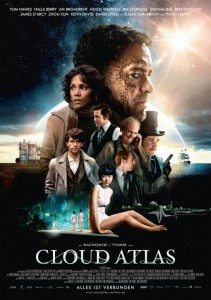 Recently, your valiant Stand By For Mind Control editors attended an early screening of Cloud Atlas, the new film by the Wachowskis and Tom Twyker. We thought it would be fun to write a joint review by bouncing emails back and forth—interlocking and interweaving our thoughts “Cloud Atlas” style. Here is the semi-brilliant result.
Recently, your valiant Stand By For Mind Control editors attended an early screening of Cloud Atlas, the new film by the Wachowskis and Tom Twyker. We thought it would be fun to write a joint review by bouncing emails back and forth—interlocking and interweaving our thoughts “Cloud Atlas” style. Here is the semi-brilliant result.
Evil Genius: Hey Supreme Being. I know I met you in Los Angeles twenty years ago, and we lived together for years, and we spent that one uncomfortable night locked together in that bouncy castle in Des Moines, but you seem…. I don’t know? Familiar somehow? Like I’ve met you before somewhere, or somewhen? This mystical connection, it makes me feel compelled to share with you my deepest, darkest, most intimate feelings about Cloud Atlas.
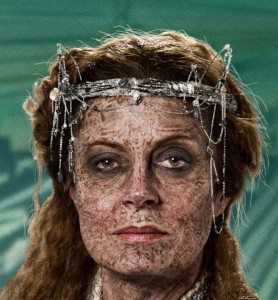
She left after an hour
Supreme Being: I too wish to unburden myself of the mystical, timeless dreams in which you’ve played so large a role, Evil Genius. I too remember a time not long ago when, seated in a darkened room, we watched a movie called Cloud Atlas. I remember it lasting a very long time, so long I began to wonder if time existed at all, and if it did, would there be enough of it left after the movie ended to do anything but keel over and die? I remember the woman sitting next to me—she looked suspiciously like Susan Sarandon—who got up and left an hour or so into the screening, and I remember thinking, “You are wise, old woman of the movie theater, so very very wise, for it’s not going to get better, is it? No, alas, it is not.” And it didn’t. We had high hopes. They were dashed.
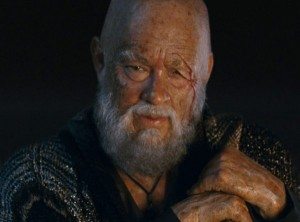
In longy-go days, had’un me a four-legger; call’im Hooch
EG: From the first flickering images of Tom Hanks—Tom Hanks!—as a wizened and wounded tribal shaman, mumbling something incomprehensible in future-speak, I glimpsyed what be the real true-true; this film was going to suck badger glands. And like many pieces of ancient wisdom that come to us through the ages, so it came to pass. I’d read “Cloud Atlas” so I had a sense of what happened in its collection of stories, but even that didn’t help. For a story about how personality and humanity iterates throughout the ages, I didn’t get to know a single character in any meaningful way
SB: What I found most disappointing was that their attempts to make clearer the links between characters and stories, which links struck me as barely present in most of the book, only served to heighten how disconnected everything felt. So Tom Hanks (and everyone else) plays a bunch of characters, and we’re supposed to assume that each character is really the same “soul” in a different body. I guess? Problem is, none of the characters have anything to do with one another. Yes, they’re all humans. Yes, they do things, often petty and mean. And that’s about it. Having the same actor embody these different people forces you to acknowledge how little the characters really have to do with one another.
EG: You speak the true-true. While some of author David Mitchell’s stories focus on the plight of the weak and the dominance of the strong, others only do so in the way pretty much ANY story would. Power dynamics are everywhere. It isn’t hard to find them. And in the film version of “Cloud Atlas,” the three directors have managed to intercut the stories so obliteratingly thoroughly that you never really sink into any of the stories, anyway. Every three minutes, you’re in a different century, with different characters, and all you can think is, “why is there a kung-fu action sequence here?” or “has anyone ever looked worse in drag than Hugo Weaving?”
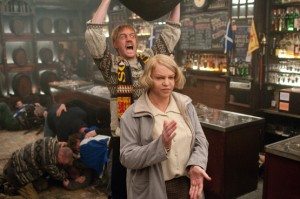
Yep. This about speaks for itself.
SB: Nobody has ever looked worse in drag than Hugo Weaving (myself excluded), I’ll yarn you that. But hey—that’s the comedy story! Ha ha! Yes, the editing. I thought, okay, they’re not going to follow the structure of the book, a great decision, it’s always wise to avoid too much fidelity to a source, you want the movie to work as a movie, and if they’re abandoning the structure of the book, which structural gimmick is, I think, the very reason the book was so beloved, then that’s rather bold of them, they must really be working hard on making this thing work as a film–or so I said to myself before sitting through it. But instead of thoughtfully moving us through these worlds, they do as you say: they obliterate everything by giving us no more than a single scene at a time from each story and whipping through them with no sense of pacing AT ALL. There is simply zero pacing to the movie. It moves at one speed for three hours straight. One quick scene after another, all the stories piling up against each other, with no time to get into any of them. This is evident in the first five minutes and it never changes, ever.
EG: It’s funny, because you’d think we would have learned from watching Cloud Atlas, that the idea of intercutting stories—or in our case our reviews of the movie via email—isn’t a great one. Doing this, no single thought finds space to reveal its depth. No one story has time to build significant context—except the grand context suggested by the book; i.e. “it’s all the same.” Right? In Cloud Atlas the movie, the only real takeaway is that across time and space (and seriously? did they need to add actual SPACE space?) everything/everyone is the same. That’s the message, which is supposed to be mystical. In practice, however, it leaves us with a three hour film in which no matter if you’re watching Halle Berry pretend to be a plucky reporter in the 70s or Ben Whitshaw act as a homosexual composer in pre-war Europe, it’s all the same. That’s the biggest problem with Cloud Atlas: it’s fucking monotonous and totally un-engaging.
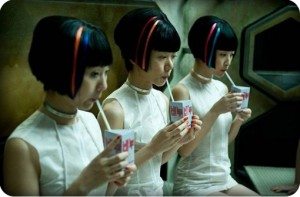
Drinking soap may be preferable to watching Cloud Atlas
SB: And that’s all on the macro-level. Looking at each story individually the problems are just as bad. The stories often don’t make any sense on their own in terms of character and theme. One of the best stories in the book, a futuristic one featuring a fabricant named Sonmi-451, is in part gutted, and in part made totally incomphrehensible, for no discernable story-based reason. The changes seem to have been made to facilitate more action chase scenes and spaceships shooting lasers. Is that really what this movie needed?
EG: Yes! Exactly. Let’s look at this story of Sonmi-451. It is, in many ways and for many reasons, the heart of the book. It is the story that most explicitly lays out the book’s theme and the one that works the best. In case you aren’t familiar, it is about one particular ‘server’—a sub-class of future almost-human who is fabricated in a lab to work as a slave. In the book, it is very clear that this Sonmi (#451), is unique. There is something special about her that allows her inherent humanity to shine through, something thought impossible. Because of this, she becomes crucial. (I am being deliberately vague, sorry.) In the film, however, her ‘uniqueness’ is only briefly touched upon and never really explained or contextualized. That makes her subsequent dramatic transformation completely baffling and, frankly, funny. Instead of explaining what makes Sonmi-451 special, we get a laser battle with some sort of superspy (not in the book). In contrast, the duller stories, where less happens, actually come across better. There was less to gloss over in favor of kung-fu and special effects. Although you still didn’t care one lick. It’s hard not to like Jim Broadbent, however.
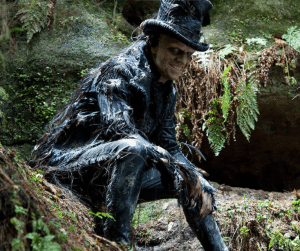
What happens when you leave Slash out in the rain too long
SB: Jim Broadbent is the best thing about the movie. He’s great in all his roles. Too bad none of the stories he’s featured in make any more emotional sense than Sonmi-451’s does. The movie undercuts itself at every turn. There’s a story on a ship at sea where a this dopey guy (Jim Sturgess) is being poisoned by Tom Hanks, only that doesn’t seem to be at all important, and there’s a stowaway slave (who I remember you mentioning in a future paragraph) hanging around, and then all of a sudden at the end there’s some big speech about the evils of slavery. Which is to say, huh? Who are these people? Why is anything happening the way it’s happening? Does anyone, ever, try to accomplish any discernable goal? Aside from avoiding lasers? I kept hoping the far, far future story would be better than the rest. In the book it was my favorite. But it too ends up meandering confusingly towards an unemotional climax, then jumps to a still farther future with old Tom Hanks yarnin’ to a ragtag bunch of kids, a scene that looks about as believable as that hilarious future-people rave scene from whichever dreadful Matrix sequel that was. And don’t get me started on the top-hat wearing Hugo Weaving as Hanks’s imaginary green devil-man Ol’ Georgie. Yikes.
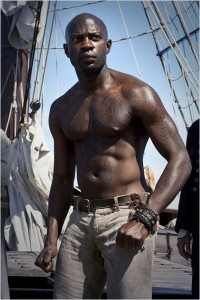
I wish there had been more David Gyasi
EG: So, in short, do we have anything good to say about Cloud Atlas? Well. Jim Broadbent can act. The film is, as you said post-screening, ambitious, and that’s something even if it fails utterly. I liked the costume design of the “Kona” nutters in the future Hawai’i. I thought Tom Hanks’ version of an Irish gangster (was that supposed to be Irish?) was one of the most unintentionally funny things ever. Doona Bae, as Sonmi, I found compelling even if her character was horribly scripted. David Gyasi, as the self-freed slave Autua, wins the award as the only actor in the film to make me believe his character was both a real person and worth caring about. Alas, he had about 5 minutes of screen time. Keith David, too, is hard to dislike as a 70’s badass. I pretty much didn’t believe and mostly hated everything else. I have so many questions as to what happened where, when, and WHY that it’s easier to just go: fuck if I care. Skip it.
SB: I’ll always take an ambitious, unusual movie over the same old bland crap Hollywood normally cranks out, even if, as in the case of Cloud Atlas, it doesn’t work at all for me. As you say, at least there’s some good acting, and here and there a scene pops or has a funny line. I’m always happy to see Keith David kicking ass. It’s just too bad the whole thing comes off as so unbelievable and fake. I have a feeling, a distant, vague feeling, like deja vu, but deja vu of the future, that you and I, Evil Genius, will one day see another movie, a better movie, and that we will say things about it, following which there will be a deep dark shot of outer space, a grand and imposing music cue, and all of a sudden there we’ll be, back in Des Moines, bouncing in the bouncy castle, forever bouncing, forever bouncing…

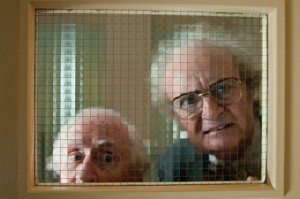
My worthless and humble opinion is that the movie works, as a movie. If one manages to keep more than one thought or image or storyline in one’s mind for more than a few moments (ADS?) it all falls into place. But then again, I watched it twice and have total recall ;)
What all falls into place?
I didn’t have a problem keeping the stories in my head (I’d read the book, too). I just didn’t see anything but the vaguest pseudo-mystical musings there. I cannot believe you watched it twice!
And your opinion is as valuable as anyone’s (except for ours).
So ya’all ocupation is to hate. Maybe such excellent movie is just to advanced for your primitive brain. And that my friend does not make the movie suck. Maybe something else suckz. Stop hatin. It’s a masterpeace. It doesn’t make it less great if I don’t understand it. It’s an masterpeace and epic. And yes, know you neandertalls gonna hate me asswell probably. Damjan from Slovenia, Europe :)
Not at all Damjan. Glad you liked it.
And thanks for raising a point I’ve been meaning to discuss. There’s a difference between saying “I like it so its good” and “It’s good so I like it.” I honestly hope everyone likes as much of their lives as possible, including the movies they watch. What we’re trying to talk about here is what we think does or does not make a film worth watching, i.e. ‘good.’ If you disagree with our arguments, that’s interesting, not insulting.
this is my very favoritest comment of all times ever. i love it asswell.